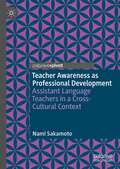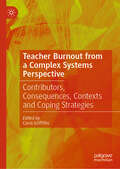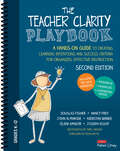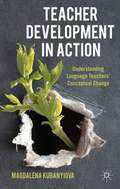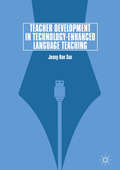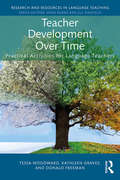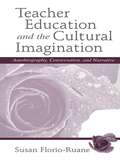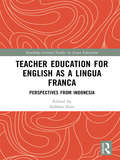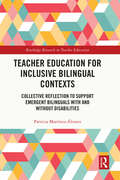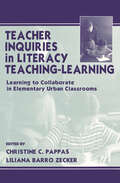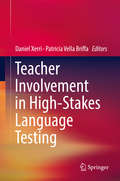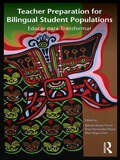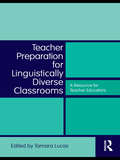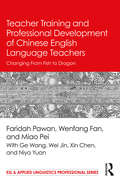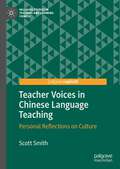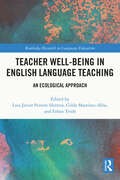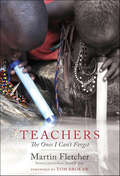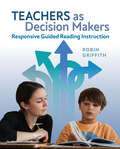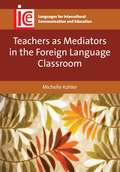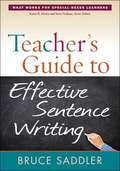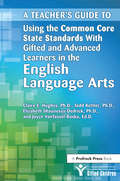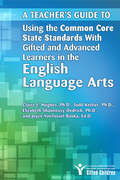- Table View
- List View
Teacher Awareness as Professional Development: Assistant Language Teachers in a Cross-Cultural Context
by Nami SakamotoThis book examines the process of identity (re)construction for assistant language teachers (ALTs) in foreign language classrooms in Japan, using Narrative Inquiry as a tool to provide a multifaceted perspective on their personal and professional growth. To develop a thorough understanding of the classroom, the author proposes three different types of awareness from the perspective of sociocultural theory. Each type of awareness is a unique lens through which to see the teachers’ world of language teaching within the classroom. Finally, the book discusses teacher development, teaching theory, and identity based on analysis of the narrative data. The book offers useful pedagogical insights that may have implications for teacher development and principles of language team teaching for teachers, teacher trainers, ALTs, boards of education, and university students of English and language education, including English as a Foreign Language (EFL).
Teacher Burnout from a Complex Systems Perspective: Contributors, Consequences, Contexts and Coping Strategies
by Carol GriffithsThis edited book investigates the factors contributing to teacher burnout and its potential consequences. Topics include the relationship of burnout to cultural identity, modality and job satisfaction, and chapters discuss various settings such as the English as a Medium of Instruction (EMI) classroom, secondary and primary schools. The book aims to provide possible solutions and ways forward for tackling the issue of burnout, both at a personal and systemic level. It will be of interest to students and scholars in the fields of teacher education, wellbeing, school and schooling, as well as practising teachers and school leadership.
The Teacher Clarity Playbook, Grades K-12: A Hands-On Guide to Creating Learning Intentions and Success Criteria for Organized, Effective Instruction
by Douglas Fisher Nancy Frey John T. Almarode Joseph Assof Olivia Amador Kierstan BarbeeUnlock the secrets to student achievement with purposeful learning and clear expectations On a clear day, you can learn forever— that’s the adapted lyric you’ll be happily humming once you’ve covered this playbook, because you will have mastered using learning intentions and success criteria, the twin engines of Teacher Clarity. This template-filled guide shows you how to own it, do it, and live it—and your students will be more successful as a result. In this fully revised edition, this succinct, smart, and swift book’s nine learning modules take you systematically through a process that begins and ends with standards. With abundant and all new examples that span grade levels, planning templates for every step, key professional learning questions, new videos, revised success criteria and relevance sections, and the latest research, you have the most practical and up-to-date planner for designing and delivering highly effective instruction: Identifying Concepts and Skills Sequencing Learning Progressions Elaborating Learning Intentions Crafting Success Criteria Modifying Learning Intentions to Include Language Expectations Determining the Relevance of the Learning Designing Assessment Opportunities Creating Meaningful Learning Experiences Establishing Mastery of Standards Designed for PLCs or independent teacher use, The Teacher Clarity Playbook helps practitioners align lessons, objectives, and outcomes of learning seamlessly, so that the classroom hours flow productively for everyone. For any teacher striving to be more organized and have stronger relationships with students, this is the book that shows you how.
The Teacher Clarity Playbook, Grades K-12: A Hands-On Guide to Creating Learning Intentions and Success Criteria for Organized, Effective Instruction
by Douglas Fisher Nancy Frey John T. Almarode Joseph Assof Olivia Amador Kierstan BarbeeUnlock the secrets to student achievement with purposeful learning and clear expectations On a clear day, you can learn forever— that’s the adapted lyric you’ll be happily humming once you’ve covered this playbook, because you will have mastered using learning intentions and success criteria, the twin engines of Teacher Clarity. This template-filled guide shows you how to own it, do it, and live it—and your students will be more successful as a result. In this fully revised edition, this succinct, smart, and swift book’s nine learning modules take you systematically through a process that begins and ends with standards. With abundant and all new examples that span grade levels, planning templates for every step, key professional learning questions, new videos, revised success criteria and relevance sections, and the latest research, you have the most practical and up-to-date planner for designing and delivering highly effective instruction: Identifying Concepts and Skills Sequencing Learning Progressions Elaborating Learning Intentions Crafting Success Criteria Modifying Learning Intentions to Include Language Expectations Determining the Relevance of the Learning Designing Assessment Opportunities Creating Meaningful Learning Experiences Establishing Mastery of Standards Designed for PLCs or independent teacher use, The Teacher Clarity Playbook helps practitioners align lessons, objectives, and outcomes of learning seamlessly, so that the classroom hours flow productively for everyone. For any teacher striving to be more organized and have stronger relationships with students, this is the book that shows you how.
Teacher Development in Action
by Magdalena KubanyiovaTeacher Development in Action offers a rich account of language teachers' engagement with the latest research in second language motivation on a year-long teacher development project. It offers an in-depth analysis of how language teachers mobilize (or not) their vast inner resources when they make sense of new material, and sheds light on why language classrooms do not always become acquisition-rich and motivating environments, even when teachers show great interest in new ideas and find them highly relevant to their practice. Drawing on a grounded theory ethnographic study of EFL teachers in Slovakia, this book breaks new theoretical ground in the language teacher cognition domain and weaves together findings from field notes, classroom observations and interviews into an integrated model of Language Teacher Conceptual Change (LTCC). The new insights into the complex and dynamic nature of teacher development constitute an original contribution to the field of applied linguistics and have significant implications for second language teacher education and development.
Teacher Development in Technology-Enhanced Language Teaching
by Jeong-Bae SonThis book explores language teacher development in computer-assisted language learning (CALL) environments and discusses approaches, tasks and resources that can guide language teachers to develop their skills and strategies for technology-enhanced language teaching (TELT). It looks at key aspects of CALL in terms of pedagogy and technology and proposes a model of CALL teacher development, which incorporates essential elements of teacher learning in CALL. Further, the author presents practical tasks and tips on how to develop knowledge and skills for the use of digital technologies in language teaching and suggests ideas to improve language teacher training and development.
Teacher Development Over Time: Practical Activities for Language Teachers (Research and Resources in Language Teaching)
by Tessa Woodward Kathleen Graves Donald FreemanTeacher Development Over Time: Practical Activities for Language Teachers addresses teacher learning over the span of the careers of both novice and experienced teachers in English Language Teaching (ELT). It is designed to a) help novice ELT teachers to see the ways in which their learning may open up careers and communities over a professional life span; and b) support experienced ELT teachers in understanding where they are in their careers and how they may respond creatively to the challenges in that particular career phase. Part 1 synthesises the views of major research on teaching as it is experienced over time by teachers and discusses the implications. Readers engage with these ideas via the activities in Part 2, which encourage them to reflect on their career paths and on possible themes for future work. Part 3 describes ways teachers can set the Part 2 activities within a busy professional life, and Part 4 helps teachers to engage in further explorations on their own or with others. By merging a strong line of research with very practical tools for understanding professional development, Teacher Development Over Time proves to be an indispensable resource for language teachers as well as teacher educators and mentors.
Teacher Education and the Cultural Imagination: Autobiography, Conversation, and Narrative
by Susan Florio-Ruane Julie deTarMaking culture a more central concept in the texts and contexts of teacher education is the focus of this book. It is a rich account of the author's investigation of teacher book club discussions of ethnic literature, specifically ethnic autobiography--as a genre from which teachers might learn about culture, literacy, and education in their own and others' lives, and as a form of conversation and literature-based work that might be sustainable and foster teachers' comprehension and critical thinking. Dr. Florio-Ruane's role in the book clubs merged participation and inquiry. For this reason, she blends personal narrative with analysis and description of ways she and the book club participants explored culture in the stories they told one another and in their responses to published autobiographies. She posits that autobiography and conversation may be useful for teachers not only in constructing their own learning about culture, but also, by doing so, in participating in the transformation of learning within the teaching profession.
Teacher Education for English as a Lingua Franca: Perspectives from Indonesia (Routledge Critical Studies in Asian Education)
by Subhan ZeinThis edited collection responds to a gap in the literature by presenting a much-needed examination of both the theoretical and practical aspects of teacher education for English as a lingua franca in Indonesia. Through a series of extended research-based and conceptual chapters written by experts in teaching English to speakers of other languages (TESOL) in and about Indonesia, this book offers an insight into Indonesia’s unique cultural, social and institutional contexts. The content focuses on four interrelated themes: the transition of perspective from English as a foreign language (EFL) to English as a lingua franca (ELF); the knowledge base of ELF pedagogy; teacher agency and identity in ELF; and innovations in teacher education for ELF. This book is highly relevant to English teachers, teacher educators and scholars worldwide aspiring to broaden their horizon and professionalism in the teaching of ELF.
Teacher Education for Inclusive Bilingual Contexts: Collective Reflection to Support Emergent Bilinguals with and without Disabilities (Routledge Research in Teacher Education)
by Patricia Martínez-ÁlvarezThis text demonstrates how collective reflection can function as a central part of effective teacher preparation for work in inclusive bilingual environments. Through analysis of rich qualitative data, Teacher Education for Inclusive Bilingual Contexts shows how group reflection supports pre-service educators to recognize the intersectional challenges faced by students, and understand their identities beyond the confines of disability. This, in turn, engenders reconceptualization of standardized expectations and implicates the educator in developing student agency through individualized use of routine, language, and materials. The author offers Cultural Historical Activity Theory (CHAT) and Disability Studies in Education (DSE) as a basis for dialectal interactions to unearth contradictions and misunderstandings surrounding language acquisition and the learning of emergent bilinguals, and highlight the ways in which educators can disrupt oppressive practices through expansive learning practices. This insightful volume will be of interest to researchers, scholars, and postgraduate students in the fields of inclusive education and disability studies, bilingual and language education, and teacher education.
Teacher Inquiries in Literacy Teaching-Learning: Learning To Collaborate in Elementary Urban Classrooms
by Christine C. Pappas Liliana Barro Zecker Liliana ZeckerThis book consists of the reports of 13 urban elementary teacher researchers' year-long inquiries around literacy topics--conducted as part of a collaborative school-university action research project. The focus is on how they attempted to transform their teaching practices to meet the needs of students from diverse ethnic and linguistic backgrounds, and how their inquiry efforts resulted in developing more collaborative styles of teaching. These teachers explore how collaborative classroom interactions occur when teachers move away from teaching-as-transmission approaches to ones in which they share power and authority with their students--viewing them not as 'at risk' but instead as 'at promise.' Because the everyday interactions between teachers and students are realized by social talk in the classroom, classroom discourse was analyzed to study and document the teacher researchers' efforts to make changes in the locus of power in literacy teaching and learning. Their chapters are filled with classroom discourse examples to illustrate their points. The volume includes teacher inquiries conducted in elementary classrooms from kindergarten through eighth grade. Three took place in bilingual classrooms, one in a special education class. These inquires cover a range of literacy topics, including reading-aloud, language richness, writing, literature discussion groups, drama, and 'pretend' reading. The background and theoretical underpinnings of the project are discussed in an introduction written by the editors; in the conclusion they pull together the major themes in the teacher researchers' chapters and discuss the political implications of their efforts to change literacy teaching and learning in their urban classrooms.
Teacher Involvement in High-Stakes Language Testing
by Daniel Xerri Patricia Vella BriffaThis book advocates that teachers should play an active role in high-stakes language testing and that more weight should be given to teacher judgement. This is likely to increase the formative potential of high-stakes tests and provide teachers with a sense of ownership. The implication is that the knowledge and skills they develop by being involved in these tests will feed into their own classroom practices. The book also considers the arguments against teacher involvement, e.g. the contention that teacher involvement might entrench the practice of teaching to the test, or that teachers should not be actively involved in high-stakes language testing because their judgement is insufficiently reliable. Using contributions from a wide range of international educational contexts, the book proposes that a lack of reliability in teacher judgement is best addressed by means of training and not by barring educators from participating in high-stakes language testing. It also argues that their involvement in testing helps teachers to bolster confidence in their own judgement and develop their assessment literacy. Moreover, teacher involvement empowers them to play a role in reforming high-stakes language testing so that it is more equitable and more likely to enhance classroom practices. High-stakes language tests that adopt such an inclusive approach facilitate more effective learning on the part of teachers, which ultimately benefits all their students.
Teacher Preparation for Bilingual Student Populations: Educar para Transformar
by Belinda Bustos FloresThe growing number of bilingual students in public schools coupled with a critical shortage of teachers specially prepared to serve this population calls for a critical examination of policies and practices in bilingual and ESL teacher preparation. This volume focuses on understanding the structural, substantive, and contextual elements of preparation programs, and provides transformative guidelines for creating Educar signature programs. Designed to improve the practice of teacher preparation by promoting dialogic conversations and applications of praxis in the preparation of bilingual/ESL teacher candidates, it emphasizes that exemplary teacher preparation requires transformative teacher educators. Simultaneously organizing the scholarship in the field and advancing new understandings, this book is must-have resource for current and future teacher educators. Contributors include Maria Brisk, Sylvia Celédon-Pattichis, Lourdes Diaz-Soto, Eugene García, Virginia Gonzáles, Guillermo Solano-Flores, Maria Torres-Guzman, Carmen Mercado, Bertha Pérez, Mari Riojas-Cortez, Francisco Rios, Concepción Valadez, and Angela Valenzuela.
Teacher Preparation for Linguistically Diverse Classrooms: A Resource for Teacher Educators
by Tamara LucasTeacher educators today need knowledge and practical ideas about how to prepare all pre-service and in-service teachers (not just bilingual or ESL specialists) to teach the growing number of students in K-12 classrooms in the United States who speak native languages other than English. This book is at the forefront in focusing exclusively on the preparation of mainstream classroom teachers for this population of students. Part one provides the conceptual and contextual framework for the book, including a comprehensive discussion of relevant demographic trends and an analysis of national and state policies. Part two presents examples of initiatives in different institutional and geographic settings, highlighting three essential elements of teacher preparation: curriculum content, program design, and program coherence. Meeting a pressing need among teacher educators left to figure out, largely by trial and error, how best to prepare non-specialist classroom teachers to work with ELLs, this book both contributes to the research base and provides practical information to help readers envision possibilities they can apply in their own settings.
Teacher Training and Professional Development of Chinese English Language Teachers: Changing From Fish to Dragon (ESL & Applied Linguistics Professional Series)
by Faridah Pawan Wenfang Fan Pei MiaoThis up-close look at Chinese ESL teachers documents undertakings at formal and informal levels to support and sustain their expertise in ways that balance collaborative and competitive efforts, situated and standards-based programs, ethnically responsive and government-based efforts, and traditional and 21st-century teaching visions. English is a mandated subject for approximately 400 million Chinese public school students. Making transparent the training and professional development received respectively by pre-service and in-service teachers, this book provides a rare window into how Chinese English Language teachers (ELTs) reconcile the two needs with the responsibility to teach large numbers of students while also navigating societal, cultural, and institutional cross currents. It also explores the range of ways China invests in the training and professional development of its English language teachers.
Teacher Voices in Chinese Language Teaching: Personal Reflections on Culture (Palgrave Studies in Teaching and Learning Chinese)
by Scott SmithThis book reports the results of an ethnographic study, focusing primarily on the experiences of four teachers of the Chinese language in Australian secondary schools. The author creates an audience for their voices as they reflect on their own understandings of culture, language teaching, and culture in language teaching through semi-structured interviews, and compares these reflections with written stimulus dialogues designed to elicit 'culture-in-language' reflections, as well as curriculum and policy documents produced by the Australian government. The book's findings indicate that teachers of the Chinese language are diverse in their views on culture, language teaching, and the ways in which culture can or should inform language teaching, and the author argues that language teacher intercultural competence cannot be assessed through a synthesis of the current English-only research literature. This book will be of interest to teachers and teacher trainers of Chinese as a foreign language, as well as students and scholars of applied linguistics and language education more broadly.
Teacher Well-Being in English Language Teaching: An Ecological Approach (Routledge Research in Language Education)
by Luis Javier Pentón Herrera Gilda Martínez-Alba Ethan TrinhThis edited volume brings the important topic of teacher well-being to the fore, presenting a range of high quality and cutting-edge contributions that illuminate, advance and educate readers on the challenges and criticality of achieving teacher well-being in English language teaching (ELT). Taking Sarah Mercer’s call for action to make teacher well-being a priority in the ELT field, and adopting an ecological perspective reflective of the stance that teacher well-being is a societal duty and not a personal responsibility, the contributors present theoretically and methodologically innovative research studies from all around the world. The term ‘teacher’ is used to refer to those who deliver English instruction in a variety of formal and informal educational settings and at different levels including K-12 schools, adult education, higher education, teacher education programs, and in community organizations. Chapters offer clear implications for research and practice, and explore effective practices and interventions that can contribute to the improvement of teacher well-being overall. Addressing a profession which is not only characterized as being filled with high levels of stress, but delving into specific challenges around ELT in particular, the authors crucially speak to themes around the additional emotional investment and labor which come with being an English language teacher. As such, it will appeal to academics and researchers in the field of English language teaching, including scholar-practitioners, and teacher educators.
The Teacher Who Couldn't Read
by Carole C. Carlson John CorcoranHere is the incredible true story of a smart kid who slipped through the system and became part of it. John Corcoran graduated from high school and college and went on to become a high school teacher--but he never learned how to read. Corcoran shares his amazing experiences of using deception to survive in a world of literates, and he clearly defines what schools, teachers, churches, and parents can do to conquer the little-known but widely spread disease of our educational system: illiteracy.
Teachers: The Ones I Can’t Forget
by Martin FletcherTeachers are the people Martin Fletcher met throughout his work as a news correspondent, often on the worst day of their lives. He watched as they picked up the pieces following personal tragedy and discovered the invaluable lesson of carrying on, no matter the circumstances. Through intimate profiles, Martin Fletcher’s Teachers details the struggles of everyday people in extraordinary circumstances—war, revolution, natural disasters and yes, life. Fletcher’s writing is uplifting as he examines the truth of resilience despite hardship. These are the people he sought out in his international reporting, detailing their woes while celebrating their will to survive and recover. Teachers offers a unique take on reporting, as it features a traveling photo exhibit that Fletcher created to accompany the book. Each chapter is paired with an extraordinary digital montage to illustrate the stories taken directly from his reporting from NBC news programs. At a time when news coverage is often dismissed as fake or biased, Teachers is a welcome reminder of the integrity, devotion and empathy that goes into true reporting of the world. As Tom Brokaw wrote, “Fletcher has a calling.”
Teachers as Decision Makers: Responsive Guided Reading Instruction
by Robin GriffithIn Teachers as Decision Makers: Responsive Guided Reading Instruction , Robin Griffith draws on years of research and countless interactions with students and teachers to present a framework of instructional decision making centered on the readers we work with, the books we share with them, and the instructional objectives we guide them toward.In this fresh look at the instructional choices we make, Griffith offers an in-depth guide in which you&’ll discover how to make effective, student-driven decisions, both while planning for and in the moments of teaching at the guided reading table, including: The Teacher Decision Making Framework, grounded in the learner, the goal, and the text Direct applications across three guided reading text level bands: Emergent, Early, and Transitional Tables, charts, and reproducible materials for easy reference in assessing and monitoring key reading behaviors at each band 50 quick reference Decision Guides for practical planning and responding in three instructional areas: Word Solving, Fluency and Expression, and Comprehension Whether you&’re new to guided reading or looking to refine your practice, this practical resource will give you the tools you need to elevate your instruction and refine your ability to make effective decisions when teaching young readers.
Teachers as Mediators in the Foreign Language Classroom
by Michelle KohlerLanguage teachers are key figures in preparing young people for participation in an increasingly multilingual and culturally diverse world, yet little is known about how they go about this in practice. This book uses examples of classroom interaction to reveal how teachers of languages act as intercultural mediators and the implications of this for practice. To date, there has been little exploration of how teachers mediate language and culture learning from an intercultural perspective, and what underlies their mediation practices in terms of their conceptions of intercultural language teaching and learning. This book offers an account of what teachers are thinking, feeling and doing as they enact an intercultural perspective on language teaching and learning.
Teacher's Guide to Effective Sentence Writing
by Bruce SaddlerThis practical book provides explicit instructions for teaching sentence-level skills to students who have difficulties in this area. The author explains the key role of sentence combining in the writing process and presents effective techniques for instruction and assessment. Numerous sample lessons, practice activities, planning tips, and grammatical pointers make it easy for teachers to incorporate sentence combining and construction into the writing curriculum at all grade levels (2-12). Accessible and engaging, the book helps teachers and students experiment with different ways to arrange thoughts and produce meaningful written work.
A Teacher's Guide to Using the Common Core State Standards With Gifted and Advanced Learners in the English/Language Arts
by National Assoc For Gifted Children Todd Kettler Elizabeth Shaunessy-DedrickA Teacher's Guide to Using the Common Core State Standards With Gifted and Advanced Learners in the English/Language Arts provides teachers and administrators a blueprint for differentiating the Common Core State Standards for English Language Arts for gifted and advanced students through the use of acceleration, depth, complexity, and creativity within and across grade levels. It illustrates the differences between learning experiences for typical and advanced students based on the same standard and provides an array of examples across five of the information text and literary text standards while integrating the other aspects of language arts teaching and learning. The book highlights implementation features, such as classroom management and assessment of student work, that allow teachers to make data-based decisions about instruction for particular students. It also offers guidance to teachers on reading selections for advanced learners at all grade levels.
A Teacher's Guide to Using the Common Core State Standards with Gifted and Advanced Learners in the English/Language Arts
by Elizabeth Shaunessy-Dedrick Claire Hughes Joyce Vantassel-Baska Todd KettlerA Teacher's Guide to Using the Common Core State Standards With Gifted and Advanced Learners in the English/Language Arts provides teachers and administrators a blueprint for differentiating the Common Core State Standards for English Language Arts for gifted and advanced students through the use of acceleration, depth, complexity, and creativity within and across grade levels. It illustrates the differences between learning experiences for typical and advanced students based on the same standard and provides an array of examples across five of the information text and literary text standards while integrating the other aspects of language arts teaching and learning. The book highlights implementation features, such as classroom management and assessment of student work, that allow teachers to make data-based decisions about instruction for particular students. It also offers guidance to teachers on reading selections for advanced learners at all grade levels.
A Teacher's Guide to Writing Workshop Essentials: Time, Choice, Response
by Katherine Bomer Corinne Arens*How can I get started with writing workshop, or refine my workshop? *What are the essential elements of a writing workshop? *How can I create daily structures and routines that support writers? In this foundational guide, Katherine Bomer and Corinne Arens describe the elegant simplicity of a Writing Workshop focused on just three essentials―time, choice, and response. Based on the research-based belief that children learn to write best when we provide a predictable, daily structure for writing, Katherine and Corinne introduce teachers to the rituals and routines of writing workshop and suggest ways to take small, incremental steps toward implementing them. Shared from the viewpoint of two veteran educators who understand the issues and obstacles teachers face day to day, A Teacher’s Guide to Writing Workshop Essentials also serves as a refresher for experienced workshop teachers looking for a chance to refocus, clarify, and extend the work in their practice. If your teaching has become more complicated and more focused on curriculum than on the writers sitting in front of you, if you’re not sure what your students really need to support them as writers, or if you’re just not sure how to get started with Writing Workshop, this guide is for you.
